
I’ve been writing about Army-Navy Games for nearly a decade.
The first and most obvious element of each of those games is also the most important one: Navy won them… which means Army lost them.
The second most evident detail of the past decade of Army-Navy Game showdowns is that the Black Knights haven’t scored much. In the past nine clashes between these service-academy rivals, Army has averaged 13 points. In the past six, barely more than 14 (14.2 when rounded to the nearest tenth of a point).
Yes, it’s true that Navy will not have Will Worth for this game. Yes, it’s true that Army’s chances of winning have soared in the past 72 hours due to the rash of injuries which has depleted Navy’s offensive backfield. Nevertheless, would Army fans be comfortable if told right now that the Black Knights will score 13 points on Saturday?
Not a chance.
Oh, 13 points MIGHT win this game given Navy’s situation, but the idea that Army fans would like their chances with 13 points — and nothing more — is not convincing at all.
Let’s get past that number, however, and shift to a few others. Whether Army scores 13 or 20 or 23 (it very probably won’t win if scoring only seven to nine points), the Black Knights must control the ball to limit Navy’s snaps.
Had Will Worth played, Army would have needed to keep the ball to prevent Navy from rolling up numbers. In this case, ball control will prevent new Navy quarterback Zach Abey from having a chance to generate any momentum or feel on Saturday.
Ideally, Army will finish drives this weekend and find a way to score 23 or more points. Ideally, Army will carve out a 10-point lead heading into the final five or six minutes so that Navy will have to pass the ball (in predictable situations) to come back. However, if the ideal scenario doesn’t unfold, Army can still gain leverage with ball control.
Limiting Navy’s time on the field (on offense) heightens the chances Army could win a 10-7 game, in the event the offense can’t finish drives. If Army can’t score big, it can at least hold the ball for 38 or more minutes. If field position works in the Black Knights’ favor, that could be enough.
Ball control’s centrality on Saturday has been hammered home.
The big point at the center of it all? Army will have to complete a few third-and-five passes for first downs to win.
*
Just because a person emphasizes a given game key for nearly a decade doesn’t mean it’s inappropriate or unwarranted to keep stressing that point each subsequent year.
During this first full week of December over the past several years, I’ve often written about the need for Army to be able to throw just enough to tip the scales against Navy. Assigning a high level of primacy and centrality to this part of the Army arsenal isn’t misplaced; the only problem is that the Black Knights haven’t been able to deliver the goods.
Navy’s defense — as anyone has seen by watching on television or engaging in film study — is conspicuously vulnerable to the pass, much more than in other seasons in the era of The Streak. Temple is not a pass-first team, but the Owls were able to throw the ball whenever they wanted to in the first 25 minutes of this past Saturday’s AAC Championship Game against the Midshipmen. Plays were not overly complicated, either. A simple long bomb, a basic seven-step dropback on fourth and seven, no bells and whistles — Temple was simply able to pass protect, throw and catch.
Navy couldn’t generate the pass rush it needed. It couldn’t bat the pass down at the line of scrimmage. It couldn’t defend the throw, even on occasions when it kept the back seven in coverage and refrained from blitzing.
Maybe Army will run the ball down Navy’s throat. Maybe Army will rarely face third downs beyond three yards and consistently create fourth-and-ones it will subsequently convert. Maybe.
Maybe.
It’s a much safer bet to say that Army will very likely need to complete third-and-five, third-and-six passes in key situations this Saturday. Not seven or eight times, but certainly three or four.
You’ll know those moments when they arrive.
Will Army be ready?
Last year, Chris Carter seemed to offer the promise of a quarterback who could bedevil Navy’s defense outside the confines of a typical triple-option play. This season, he hasn’t been a factor. No matter — Ahmad Bradshaw certainly remembers last year’s Navy game as much as anyone else. He knows he’ll have to make that handful of plays to tip the scales.
Yes, Bradshaw would prefer to make those plays as a runner, but given the depth and breadth and length of The Streak, which Army so desperately wants to erase, it only makes sense that Army will have to do uncomfortable things, uncommon things, feats which haven’t been forged or found very much since 2001, the last time West Point conquered Annapolis on the gridiron.
Coming alive on third and five — completing clutch first-down-bearing passes — will probably be as important as anything else Army does on Saturday if it finally puts this 14-game skid against Navy to rest.



